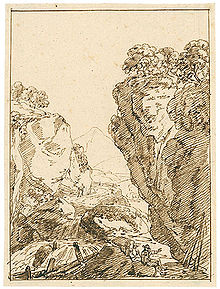art.wikisort.org - Artist
Friedrich Müller (13 January 1749 – 23 April 1825), German poet, dramatist and painter from the Electoral Palatinate, is best known for his slightly sentimental prose idylls on country life. Usually known as Maler Müller (i.e. Painter Müller).

Early life and education
Müller was born in Kreuznach. He showed a talent for art in his youth, and studied painting at Zweibrücken, where his personality and varied endowments won him the favor of court circles. At 18, he published several collections of etchings which attracted much attention with their originality. In 1774-1775, he settled in Mannheim, where he soon acquired a reputation as a poet. In 1777 he was appointed court painter.
Painting

In 1778 he was enabled by a public subscription to visit Italy, which remained his home for the rest of his life. In 1780 he became a Roman Catholic. He was unfavourably influenced by the study of Italian models, and gradually became estranged from painting through failures and distress. He devoted himself instead to the study of the history of art. He became a sort of ambulant antiquary, and his services as cicerone were especially in demand among German visitors to Rome.
Literature
Before he left Mannheim, he had tried his hand at literature, under the influence of the Sturm und Drang movement. In 1775, he published several idylls: Satyr Mopsus, Der Faun, Bacchidon und Milon, Der erschlagene Abel and Die Schafschur. In form and content, these were closely modeled on the works of Solomon Gessner.[1] In 1778 came Adam's First Awaking and First Happy Nights (Adams erstes Erwachen; 2nd revised edition, 1779). A lyric drama of the same year, Niobe (1778), attracted little attention, but Faust's Leben dramatisiert (Faust's Life Dramatized) (1778) appealed to the turbulent spirit of the time, and Golo und Genoveva (begun in 1776, but not published until 1801) was an excellent imitation of Goethe's Götz von Berlichingen.
In his idylls, notably Die Schafschur and Das Nusskernen (1811), he struck out a more independent path. In these, emancipating himself from the artificiality of Gessner, he realistically reproduced scenes from the German peasant life of his day, not without a touch of satire. His later idylls took Voss as a model.
Maler Müller's Werke appeared in 3 vols. (1811–1825); in 1868 H. Hettner published two volumes of Dichtungen von Maler Müller, which contain most of his writings. Gedichte von Maler Friedrich Müller; eine Nachlese zu dessen Werken appeared in 1873, and his Fausts Leben was reprinted by B. Seuffert in 1881.
Later years
Through the patronage of the Crown Prince of Bavaria (afterwards King Louis I), he was enabled to pass his declining years in comparative ease. He died in Rome in 1825.
Notes
- Erich Schmidt (1885), "Müller, Friedrich", Allgemeine Deutsche Biographie (ADB) (in German), vol. 22, Leipzig: Duncker & Humblot, pp. 530–535
References
- Reynolds, Francis J., ed. (1921). . Collier's New Encyclopedia. New York: P. F. Collier & Son Company.
- Gilman, D. C.; Peck, H. T.; Colby, F. M., eds. (1905). . New International Encyclopedia (1st ed.). New York: Dodd, Mead.
- Ripley, George; Dana, Charles A., eds. (1879). . The American Cyclopædia.
Attribution
- This article incorporates text from a publication now in the public domain: Chisholm, Hugh, ed. (1911). "Müller, Friedrich". Encyclopædia Britannica (11th ed.). Cambridge University Press.
Further reading
- Seuffert, Der Maler Müller (Berlin, 1877)
External links
| Wikimedia Commons has media related to Maler Müller. |
- . Encyclopedia Americana. 1920.
На других языках
[de] Maler Müller
Johannes Friedrich Müller, genannt Maler Müller oder Teufelsmüller[1][2] (* 13. Januar 1749 in Kreuznach; † 23. April 1825 in Rom), war ein deutschrömischer Maler, Kupferstecher und Dichter des Sturm und Drang.- [en] Maler Müller
[es] Friedrich Müller
Friedrich Müller (Kreuznach, 13 de enero de 1749 - Roma, 23 de abril de 1825), poeta, dramaturgo y pintor alemán, perteneciente al Sturm und Drang, conocido por su ligera prosa sentimental e idilios sobre la vida campesina,[fr] Friedrich Müller (peintre)
Friedrich Müller (dit en allemand Maler Müller, ce qui signifie « le peintre Müller »), né le 13 janvier 1749 à Kreuznach et mort le 23 avril 1825 à Rome[1], est un peintre romantique prussien et un poète du Sturm und Drang.[it] Friedrich Müller (poeta)
Friedrich Müller (Kreuznach, 13 gennaio 1749 – Roma, 23 aprile 1825) è stato un poeta, drammaturgo e pittore tedesco, conosciuto soprattutto per i suoi idilli in prosa dal tono leggermente sentimentale sulla vita di campagna.[ru] Мюллер, Фридрих (1749)
Фридрих Мюллер (нем. Friedrich Müller, Мюллер-живописец (нем. Maler Müller); 13 января 1749, Бад-Кройцнах — 23 апреля 1825, Рим) — немецкий поэт, драматург и художник, близкий к движению «Бури и натиска».Другой контент может иметь иную лицензию. Перед использованием материалов сайта WikiSort.org внимательно изучите правила лицензирования конкретных элементов наполнения сайта.
WikiSort.org - проект по пересортировке и дополнению контента Википедии